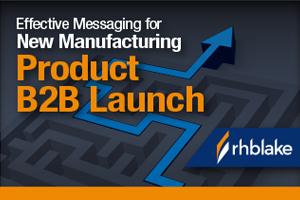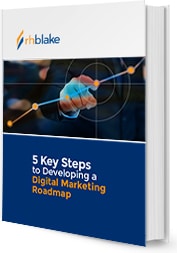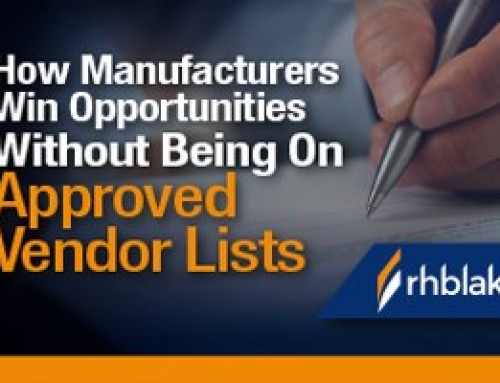Messaging for New Manufacturing Product B2B Launch
 When launching a new B2B product, leading manufacturing marketers uniquely understand that you have to get a number of elements right in order to be successful. One of the elements that has the greatest impact on product launch success is effective messaging. Too often, manufacturers overlook the role messaging plays in ensuring your new product is positioned strategically in a market category that emphasizes your unique strengths and differentiates you from competing alternatives (including no decision).
When launching a new B2B product, leading manufacturing marketers uniquely understand that you have to get a number of elements right in order to be successful. One of the elements that has the greatest impact on product launch success is effective messaging. Too often, manufacturers overlook the role messaging plays in ensuring your new product is positioned strategically in a market category that emphasizes your unique strengths and differentiates you from competing alternatives (including no decision).
Did you know? Fifty percent of product launches fail (McKinsey)
To help, we’ve developed the following article describing a proven messaging framework you could consider using in your next b2b product marketing launch.
Why New-Product Messaging Fails
Before we prescribe the remedy, let’s diagnose the ailment. New products fail for six primary reasons.
- The manufacturer doesn’t have a history of the types of messaging that are effective with a new product of the kind they are launching
- Since the product is new, the manufacturer doesn’t have any case studies or customer testimonials to use as proof points that back up manufacturer claims
- The manufacturer doesn’t know how to create brand and product messaging that differentiates the product in the marketplace
- To gain traction, new products need buyers. The manufacturer doesn’t know how to craft messages that create urgency and compel action
- Few products are launched into a vacuum in the market. The manufacturer’s messaging fails to integrate the new product with the company’s existing product portfolio and brand messages
- The manufacturer concentrates on buyer-facing messaging only, failing to create internal messaging to educate salespeople, support teams and other internal stakeholders
The key takeaway for your manufacturing business is that messaging matters—a lot. Getting your new-product messaging right is critical to ensuring a successful launch.
How to Ensure New-Product Messaging Effectiveness: RH Blake Messaging Framework for B2B Product Launches
The secret to nailing your new-product messaging is to follow a tested and proven method. At RH Blake, we help manufacturers and companies that sell to manufacturers create compelling new-product messaging. Here is the messaging framework we frequently use, and how to use it.
| Target Audience | |||||
| Pain Points | |||||
| Key Decision Criteria | |||||
| Product | |||||
| Differentiation | |||||
| Aspirational Narrative | |||||
| Brand Promise | |||||
| Proof Points | |||||
Target Audience
Who is the primary buyer you are targeting with your messaging? This is the most important question you will ask. Your new-product messaging begins and ends with your buyer. Before you can sell a single offering to anyone you must first understand who you are selling to.
The more specific the answer, the greater the chance of success as you must prioritize your energy—and marketing budget. Start with the industry that your B2B buyer is in. Then narrow your criteria by geography, company size, annual revenue, compelling events to consider a new solution, shifts in market, function, and any other criteria that helps you pinpoint who your messaging must educate and persuade.
If you had just one sales call to make, who would you call? Take your answer and craft your target audience from it.
Pain Points
What are the pains, challenges and obstacles that your target audience faces that your new product resolves? To be relevant to your market, your product must meet an identifiable need, or needs.
Key Decision Criteria
What will make or break a deal for one of your buyers? What are the must-have requirements on their checklist that your product simply has to meet? Think price, functionality, support, integration with existing systems and processes, warranty, vendor reputation and more.
Product/Offering
What are you selling? Describe it using terms that your target audience understand.
Differentiation
How is your product unique? What is there about the product that makes it different in a compelling way (a way that matters to your buyers) from all competing offerings.
Aspirational Narrative
How does your offering uniquely help target customers overcome and/or sidestep the typical hurdles they would face when working towards achieving their objectives. Consider including the following 5 components in this aspirational narrative: 1) How has/will your customers world change? Why shouldn’t they just continue with the status quo? 2) Within your product’s context, what are the key pain points/pressures they are facing? 3) What does the ideal approach/solution look like? What is the desired state? 4) How does your product help address these pain points and achieve the new desired state better than alternatives? 5) What are your differentiated proof points and reasons the customer should believe?
Your new-product messaging is like a skyscraper that’s supported by pillars. Each pillar is a promise that you make to your buyer. Typically, at least one of those pillars should be about your company. And at least two should be about your product.
Proof Points
What evidence do you have to support your brand pillars? Think test results, awards, case studies, customer testimonials, market leadership.
The Product Launch Messaging Framework in Real Life: A Simplified and Scaled-Down Example
Now that we have the theory out of the way, here’s what a simplified, scaled down RH Blake Messaging Framework may look like when completed. This is a fictional company and a fictional product.
| Target Audience |
| ||||
| Pain Points |
| ||||
| Key Decision Criteria | Must have:
| ||||
| Product |
| ||||
| Differentiation |
| ||||
| Aspirational Narrative | Offshore oil and gas companies near the Gulf of Mexico are faced with increasingly stringent compliance regulations and an aging workforce. Manual methods for diagnosing drilling issues can't keep up with requirements and cause increased safety and performance risks. Acme Drilling Software offers an automated tool that leverages proprietary technology to monitor and predict drilling performance in real-time. And unlike next-best alternatives have been tested and proven in the Gulf of Mexico. | ||||
| Brand Promise | Experience | Reliability | Expertise | ||
| Proof Points | 15 years in the Gulf of Mexico Patented deep-sea drilling software Dozens of oil and gas companies using our solutions | Tested offering 6 successful pilot projects in salt-water environments Certified Integrates with existing systems | 25 years of expertise in offshore drilling 19 engineers with more than 220 years of combined offshore oil and gas expertise | ||
Conclusion
Your new product has a 50/50 chance of succeeding in the marketplace. If you want to nail it with your launch, nail your messaging. The path to success requires you to deeply understand your buyers, including their industry, challenges and buying criteria. You must understand the void that your product fills. And you must know what sets you apart from your competitors, as a brand in general, and with your new product in particular.
Complete this RH Blake Messaging Framework for B2B Product Launches carefully and methodically, and you will improve your odds dramatically. And if you’d like a downloadable version of this framework, complete the form below.
Request the RH Blake Messaging Template for New Product Launches
Messaging for New Manufacturing Product B2B Launch

When launching a new B2B product, leading manufacturing marketers uniquely understand that you have to get a number of elements right in order to be successful. One of the elements that has the greatest impact on product launch success is effective messaging. Too often, manufacturers overlook the role messaging plays in ensuring your new product is positioned strategically in a market category that emphasizes your unique strengths and differentiates you from competing alternatives (including no decision).
Did you know? Fifty percent of product launches fail (McKinsey)
To help, we’ve developed the following article describing a proven messaging framework you could consider using in your next b2b product launch.
Why New-Product Messaging Fails
Before we prescribe the remedy, let’s diagnose the ailment. New products fail for six primary reasons.
- The manufacturer doesn’t have a history of the types of messaging that are effective with a new product of the kind they are launching
- Since the product is new, the manufacturer doesn’t have any case studies or customer testimonials to use as proof points that back up manufacturer claims
- The manufacturer doesn’t know how to create brand and product messaging that differentiates the product in the marketplace
- To gain traction, new products need buyers. The manufacturer doesn’t know how to craft messages that create urgency and compel action
- Few products are launched into a vacuum in the market. The manufacturer’s messaging fails to integrate the new product with the company’s existing product portfolio and brand messages
- The manufacturer concentrates on buyer-facing messaging only, failing to create internal messaging to educate salespeople, support teams and other internal stakeholders
The key takeaway for your manufacturing business is that messaging matters—a lot. Getting your new-product messaging right is critical to ensuring a successful launch.
How to Ensure New-Product Messaging Effectiveness: RH Blake Messaging Framework for B2B Product Launches
The secret to nailing your new-product messaging is to follow a tested and proven method. At RH Blake, we help manufacturers and companies that sell to manufacturers create compelling new-product messaging. Here is the messaging framework we frequently use, and how to use it.
| Target Audience | |||||
| Pain Points | |||||
| Key Decision Criteria | |||||
| Product | |||||
| Differentiation | |||||
| Aspirational Narrative | |||||
| Brand Promise | |||||
| Proof Points | |||||
Target Audience
Who is the primary buyer you are targeting with your messaging? This is the most important question you will ask. Your new-product messaging begins and ends with your buyer. Before you can sell a single offering to anyone you must first understand who you are selling to.
The more specific the answer, the greater the chance of success as you must prioritize your energy—and marketing budget. Start with the industry that your B2B buyer is in. Then narrow your criteria by geography, company size, annual revenue, compelling events to consider a new solution, shifts in market, function, and any other criteria that helps you pinpoint who your messaging must educate and persuade.
If you had just one sales call to make, who would you call? Take your answer and craft your target audience from it.
Pain Points
What are the pains, challenges and obstacles that your target audience faces that your new product resolves? To be relevant to your market, your product must meet an identifiable need, or needs.
Key Decision Criteria
What will make or break a deal for one of your buyers? What are the must-have requirements on their checklist that your product simply has to meet? Think price, functionality, support, integration with existing systems and processes, warranty, vendor reputation and more.
Product/Offering
What are you selling? Describe it using terms that your target audience understand.
Differentiation
How is your product unique? What is there about the product that makes it different in a compelling way (a way that matters to your buyers) from all competing offerings.
Aspirational Narrative
How does your offering uniquely help target customers overcome and/or sidestep the typical hurdles they would face when working towards achieving their objectives. Consider including the following 5 components in this aspirational narrative: 1) How has/will your customers world change? Why shouldn’t they just continue with the status quo? 2) Within your product’s context, what are the key pain points/pressures they are facing? 3) What does the ideal approach/solution look like? What is the desired state? 4) How does your product help address these pain points and achieve the new desired state better than alternatives? 5) What are your differentiated proof points and reasons the customer should believe?
Your new-product messaging is like a skyscraper that’s supported by pillars. Each pillar is a promise that you make to your buyer. Typically, at least one of those pillars should be about your company. And at least two should be about your product.
Proof Points
What evidence do you have to support your brand pillars? Think test results, awards, case studies, customer testimonials, market leadership.
The Product Launch Messaging Framework in Real Life: A Simplified and Scaled-Down Example
Now that we have the theory out of the way, here’s what a simplified, scaled down RH Blake Messaging Framework may look like when completed. This is a fictional company and a fictional product.
| Target Audience |
| ||||
| Pain Points |
| ||||
| Key Decision Criteria | Must have:
| ||||
| Product |
| ||||
| Differentiation |
| ||||
| Aspirational Narrative | Offshore oil and gas companies near the Gulf of Mexico are faced with increasingly stringent compliance regulations and an aging workforce. Manual methods for diagnosing drilling issues can't keep up with requirements and cause increased safety and performance risks. Acme Drilling Software offers an automated tool that leverages proprietary technology to monitor and predict drilling performance in real-time. And unlike next-best alternatives have been tested and proven in the Gulf of Mexico. | ||||
| Brand Promise | Experience | Reliability | Expertise | ||
| Proof Points | 15 years in the Gulf of Mexico Patented deep-sea drilling software Dozens of oil and gas companies using our solutions | Tested offering 6 successful pilot projects in salt-water environments Certified Integrates with existing systems | 25 years of expertise in offshore drilling 19 engineers with more than 220 years of combined offshore oil and gas expertise | ||
Conclusion
Your new product has a 50/50 chance of succeeding in the marketplace. If you want to nail it with your launch, nail your messaging. The path to success requires you to deeply understand your buyers, including their industry, challenges and buying criteria. You must understand the void that your product fills. And you must know what sets you apart from your competitors, as a brand in general, and with your new product in particular.
Complete this RH Blake Messaging Framework for B2B Product Launches carefully and methodically, and you will improve your odds dramatically. And if you’d like a downloadable version of this framework, complete the form below.






